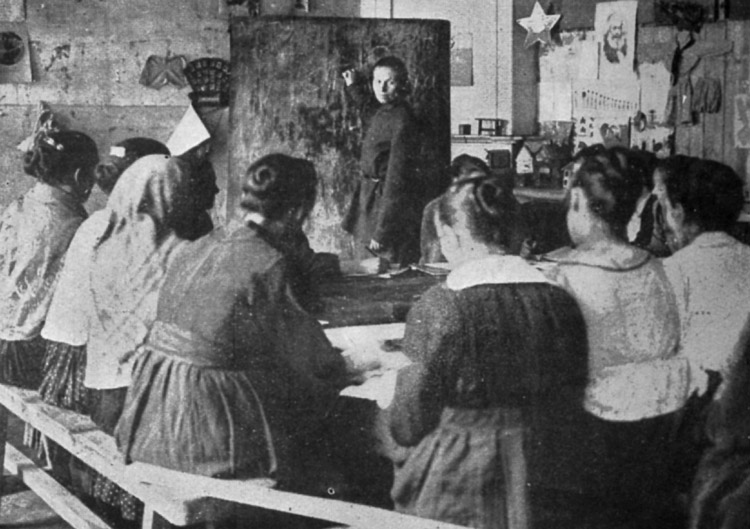Women and the Family by Leon Trotsky is one of Pathfinder’s Books of the Month for November. Trotsky describes how under the leadership of Lenin and the Bolshevik Party workers and peasants fought to defend their revolution and to transform themselves and social relations. This included charting a course to liberate women from endless toil at home to be able to take part in the cultural and political life of the nation. The excerpts are from Trotsky’s 1925 article, “To Build Socialism Means to Emancipate Women and Protect Mothers.” Copyright © 1970 by Pathfinder Press. Reprinted by permission.
The most accurate way of measuring our advance is by the practical measures which are being carried out for the improvement of the position of mother and child. This index is very reliable; it does not deceive. It immediately shows both the material successes and the cultural achievements in the broad sense. Historical experience shows that even the proletariat, already struggling with the oppressors, is far from prompt in concentrating the necessary attention on the oppressed position of woman as housewife, mother, and wife. Such is the terrible force of being accustomed to the family slavery of woman! There is no point in even talking about the peasantry. The burden and hopelessness of the fate of the peasant woman, and not only from poor but even from middle families, can probably not be compared today even with the worst penal servitude. No rest, no holiday, no gleam of hope! Our revolution is only gradually reaching down to the familial foundations, mainly in the towns, for the moment, in the industrial regions, and only very slowly is it penetrating into the countryside. And the problems here are immeasurable.
To alter the position of woman at the root is possible only if all the conditions of social, family, and domestic existence are altered. The depth of the question of the mother is expressed in the fact that she is, in essence, a living point where all the decisive strands of economic and cultural work intersect. The question of motherhood is above all a question of an apartment, running water, a kitchen, a laundry room, a dining room. But it is just as much a question of a school, of books, of a place for recreation. Drunkenness beats down most mercilessly on the housewife and mother. Illiteracy and unemployment also. Running water and electricity in the apartment lighten the woman’s burden above all. …
Just as it was impossible to approach the construction of the Soviet state without freeing the peasantry from the tangles of serfdom, so it is impossible to move to socialism without freeing the peasant woman and the woman worker from the bondage of family and household. And if we used to determine the maturity of a revolutionary worker not only by his attitude to the capitalist but also by his attitude to the peasant, i.e., by his understanding of the necessity of freeing the peasant from bondage — so now we can and must measure the socialist maturity of the worker and the progressive peasant by their attitude to woman and child, by their understanding of the necessity of freeing from bondage the mother in penal servitude, of giving her the possibility of straightening her back and involving herself as she should in social and cultural life.
Motherhood is the hub of all problems. That is why each new measure, each law, each practical step in economic and social construction must also be checked against the question of how it will affect the family, whether it worsens or lightens the fate of the mother, whether it improves the position of the child.
The great number of homeless children in our towns bears most terrible witness to the fact that we are still caught up on all sides in the tangles of the old society, which manifests itself in the most vicious way in the epoch of its downfall. The position of mother and child was never so difficult as in the years of the transition from the old to the new, especially in the years of the civil war. … [T]he homelessness of the child is above all the fruit of maternal homelessness. Consideration for the mother is the truest and deepest way to the improvement of the fate of the child.
The general growth of the economy is creating the conditions for a gradual reconstruction of family and domestic life. All questions connected with this must be posed in their full magnitude. We are approaching from various directions the renewal of the basic capital of the country; we are acquiring new machines to replace the old ones; we are building new factories; we are renewing our railways; the peasant is acquiring plows, seeders, tractors.
But the most basic “capital” is the people, i.e., its strength, its health, its cultural level. This capital requires renewal even more than the equipment of the factories or the peasant implements. It must not be thought that the ages of slavery, hunger, and bondage, the years of war and epidemics, have passed without a trace. No, they have left behind in the living organism of the people both wounds and scars. Tuberculosis, syphilis, neurasthenia, alcoholism — all these diseases and many others are spread widely among the masses of the population. The nation must be made healthy. Without that, socialism is unthinkable.
We must reach the roots, the sources. And where is the source of the nation if not in the mother? The struggle against the neglect of mothers must be given first place! Housing construction, the construction of child-care facilities, kindergartens, communal dining rooms and laundries must be put in the center of attention, and that attention must be vigilant and well organized. Here questions of quality decide all. Child-care, eating and laundry facilities must be set up so that by the advantages they provide they can deal a deathblow to the old closed-in, isolated family unit, completely supported on the bent shoulders of the housewife and mother. … Caring for children in public facilities, as well as feeding of adults in communal canteens, is cheaper than in the family. But the transfer of material means from the family to the child-care centers and canteens will take place only if the social organization learns to satisfy the most primary demands better than the family. … Vigilant social control and constant urging on all the organs and institutions which serve the family and domestic needs of the toiling masses is essential.


